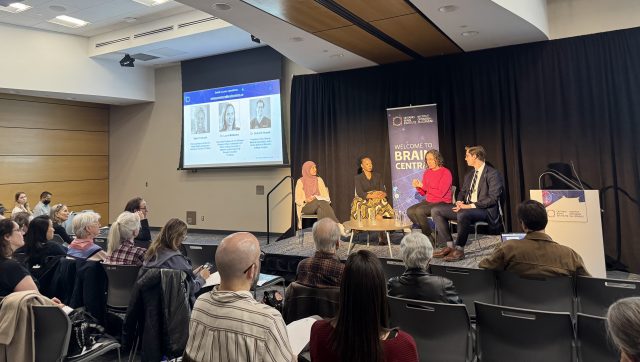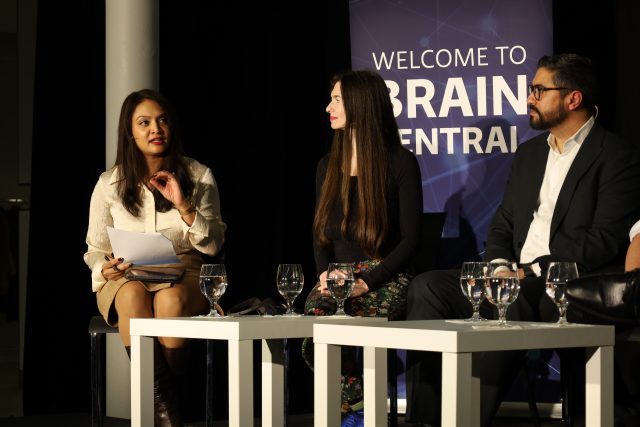Content Warning: The article below discusses themes of suicide and mental health struggles. Resources are available at the end of this blog.
The night before you died, we laughed. You teased me for always being “aggressively optimistic”, and we had joked about career prospects given our inability to do simple math. We talked about the ridiculous memes we had been sending each other during the day and made plans for dinner the following week. You wanted me to show you my new telescope, so we joked about stargazing from the parking lot of our favourite takeout place. We laughed a lot that night. I’ve always wondered if you knew then how much you meant to me.
Two years ago, I lost one of my best friends. I was working toward my PhD at the time and depression was one of the conditions I studied. It was also something I had witnessed several friends and family members struggle with while I was growing up. Naturally, mental health advocacy quickly became a personal priority. I suppose I should’ve expected I’d end up in mental health research too.
The day she died, I had called her several times, but every call went straight to voicemail. I wouldn’t learn about her death until I spoke with her family later that afternoon. They told me she had died by suicide just a few hours before. They said a lot of other things too, but I couldn’t process anything else. I was too distracted thinking about how they were wrong. I had just spoken to her the night before and we were laughing. We made plans. There was nothing unordinary about our last interaction. When their words finally started to register again, I felt the air get so heavy I could barely breathe. It didn’t make sense. How could I not know she was struggling? We spoke every day. I thought we were best friends. Did she think I wouldn’t care? I would have never left her side. I don’t know whether that conversation had lasted a few minutes or a few hours, but I know that grief didn’t fully capture what I was feeling.
“I had felt grief before, but this pain was unfamiliar. It was a pain I couldn’t quite put into words.”
In the days and weeks that followed, I struggled to eat, sleep, and focus. I cried nearly every day, but not just because I was sad. I was cycling through impossible feelings. I was mad at her for leaving me, but I felt guilty about being mad. I’d blame myself for her death and the guilt would lead to more confusion about the signs I must’ve missed. But every feeling made me cry. I cried so much my face hurt. I didn’t know it could be so exhausting. How could I move toward a future where I was still alive, and she wasn’t? Some days I would cry until I fell asleep. Most days it took everything in me just to get out of bed. On my worst days I’d wake up from a good dream, having forgotten my new reality. Coming out of those brief moments of peace between being asleep and being awake made mornings intolerable. It was like being stuck in a time loop having to relive the same heartache over and over again. Her death became my limbo. I thought that I understood sadness, but I wasn’t prepared for a world that could keep spinning while time stayed frozen for me.
The “rational” part of me began to recognize what was going on. I just needed to find a way to pick up the pieces. I’d talk to a professional. Or exercise and eat healthy… just power through it. I’d be back to work in a few weeks, and everything would be fine. Apparently, the aggressive optimism that my dear friend always mocked me for was beginning to manifest as an absurd fantasy of how grief worked. I seemed to think I could approach my pain the way I approached my new year’s resolutions.
“Perhaps my biggest misconception was thinking I knew what to expect. I gave myself deadlines for how long I was allowed to cry, and I’d try to distract myself with my work. I was trying so hard to avoid the pain and heal by relying on just my basic academic understanding of mental health.”
But grief isn’t linear or predictable. The most unexpected things would bring me to tears. She was everywhere and nowhere, and I was always just here. Imagine attempting to swim through waves of emotions, only to be pulled under by the same negative thoughts every time. It took a while for me to understand why the grief of losing her was different. I lost someone I loved to suicide, but I also lost any semblance of the control I once thought I had. As a researcher, my job required me to collect and analyze data. But as a mental health researcher, I also felt it was my responsibility to conceptualize that data to improve mental health outcomes. How could I lose her to the very problem I had been trying to solve? I knew the warning signs, I knew the risk factors, and I knew the statistics. For so long, my ego wouldn’t let me process her death. I was ashamed. I felt guilty that my knowledge couldn’t save her. I was analyzing everything she had ever said to try and make sense of something that was never going to make sense. My life was suddenly full of paradoxes I couldn’t comprehend. The most inconceivable part of it all was knowing that every question I had would go unanswered.
“I was only ever taught to look for solutions — I never learned how to sit with my questions.”
It seems obvious to me now, but my academic background was never going to make my friend or me immune to feeling pain. That realization brought new meaning to my work. Neither of us were prepared to experience the overwhelming emotions that came with depression. I had seen glimpses of it during my studies, but it had eluded me otherwise. I spent years reading page after page about how multifaceted depression is, but I had never completely faced it head on. I had only understood it as a medical dilemma that needed to be solved. I’ve often heard the word ‘depression’ used synonymously with sadness, but they’re not the same. Depression comes with a sense of hopelessness that’s both cruel and unforgiving. It can’t be described using everyday vocabulary, and it can’t be easily translated into clinical terms. The most terrifying thing about it for me is knowing that it can lead to the irreversible suffering that comes with suicide. A pain that I’ve now become acquainted with. I had never previously known depression in that way, but it forced me to see my research from perspectives I hadn’t considered. I had it backwards before. Allowing myself to feel the pain is what would help me become a better academic.
When I think about my friendship with her now, I remember how fun it was. I used to get disgustingly sentimental with her just because she found it annoying. It made me do it more. When she died, I remember telling myself that it hurt so much because my pain was rooted in love. She would’ve undoubtedly rolled her eyes at that, but I think I was right. The grief still creeps up on me sometimes and wrecks me like it did that first day. I see it as the weight I carry for loving her so deeply. It wasn’t until I allowed myself to feel the heaviness of losing her, that my healing really began. I’ve since let go of my rigid notions of grief. I no longer have expectations for it, nor do I judge myself for how I respond to it. I’d be lying if I said that made things easier. I’ve had to learn to see my pain for what it is and accept that I have no control over it. Admittedly, I’m still coming to terms with that last part, but I’m sure I’ll figure it out eventually. Until then, I’ll use my telescope to continue stargazing from the parking lot of our favourite takeout spot.
Resources:
- Canadian Mental Health Association Ontario: Mental Health Crisis Resources
- Distress Centres of Greater Toronto – 24/7 distress and crisis line: 416-408-HELP (408-4357)
- Survivors of Suicide Loss Support
- Canadian Biomarker Integration Network in Depression (CAN-BIND) Community Resources
- Kids Help Phone – 1-800-668-6868
- Gerstein Crisis Centre (Toronto) – 416-929-5200
- Talk Suicide Canada (national service) – Phone: 1-833-456-4566, Text: 45645
- Personal reflections share the hardships, grief, hope, and resilience of those experiencing suicidality or who have lost loved ones to suicide. The Arthur Sommer Rotenberg (ASR) Suicide & Depression Studies Program launched the Storybook Project with this in mind. The initiative aims to amplify the voices of those with personal experience with suicide, decrease stigma, and foster connection through storytelling. Learn more at https://asrlife.ca/storybook/.
The author wishes to remain anonymous for this publication, and the Ontario Brain Institute thanks them for contributing to Breaking Stigma, Building Empowerment: a storytelling project.
Breaking Stigma, Building Empowerment: a storytelling project amplifies honest and diverse narratives from advocates with lived experience within the brain health community. To read other stories from Breaking Stigma, Building Empowerment, visit https://braininstitute.ca/buildingempowerment



